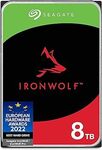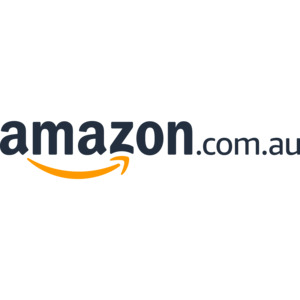About this item
IronWolf internal hard drives are the ideal solution for up to 8-bay, multi-user NAS environments craving powerhouse performance
Store more and work faster with a NAS-optimized hard drive providing 8TB and cache of up to 256MB
Purpose built for NAS enclosures, IronWolf delivers less wear and tear, little to no noise/vibration, no lags or down time, increased file-sharing performance, and much more
Easily monitor the health of drives using the integrated IronWolf Health Management system and enjoy long-term reliability with 1M hours MTBF
Seagate IronWolf 8TB NAS HDD – 3.5 Inch SATA 6Gb/s 7200 RPM 256MB Cache $270.73 Delivered @ Amazon US via AU
Last edited 08/04/2024 - 13:09 by 1 other user
 CamelCamelCamel.
CamelCamelCamel.Related Stores
closed Comments

At a very general level a NAS drive is optimised for random read / write, a surveillance drive is optimised for sequential read / write. Both are designed for 24hr x 7 operation, whilst a standard drive assumes more 8*5. In short though, yep a NAS drive is fine for CCTV.
From a price perspective this is reasonable, but unless you are in a hurry it might be worth waiting for a better deal. Also keep your eye out for deals on Seagate Exos drives that apparently can be noisier than the Iron Wolf jobs but may be cheaper for same or even more storage - just avoid re-certified, and be aware that warranty may be via the seller rather than direct via Seagate.

Thanks for sharing the info! What price range will be considered as a good deal for this Seagate IronWolf 8TB NAS HDD?

Probably mid to low $200 mark. They have been available for under $200 a few times when Seagate do promotions - with cashback or providing discounts when buying multiple drives. I was lucky enough to get some then, but the last ones I got a few months ago were around $250 or so. Keep in mind that much larger drives have been released since these first came out, so for not much more you may be able to get much larger drives.

How are they optimised differently?
Same disk spinning at the same speed in the same direction, same heads, and the only thing that would optimise random access would be a second set of heads in there, and to my knowledge that hasn't made it to the consumer market yet.
The only difference Toshiba can point to is vibration sensors, and even that seems dubious, given the vast numbers of users successfully packing heaps of consumer drives into UnRAID/TrueNAS builds.

The thing to remember is with a raid array a data file is spread over multiple drives. The firmware for drives designed for use in raid can optimise how the cache is used to improve the speed for both writing and reading data from multiple drives. This is not the place for this discussion, but if you want some info about how Seagate do it they have a doc here: https://www.seagate.com/files/www-content/product-content/na…

@PlasticSpaceman: Yeah, so that Seagate doc is (again) mostly fluff. NAS drives spend less time trying to recover from errors, but that doesn't distinguish them from surveillance drives; and their queuing algorithm still has to sort reads and writes by which part of the disk is approaching the R/W head first.
I call shenanigans; I think that's why when you shuck a USB "desktop" drive you so frequently get a NAS or surveillance disk instead - there's no substantial difference.

I wish I had bought 4 last year in June when they were $166

I'm still pissed off mine were lost in transit.

Why would that never happen again? $/TB, like most tech stuff, is on a longterm downstrend. It’s a question of when, not if.

Yeah, never was hyperbolic on my part. But as someone who's been looking out for NAS drive bargains for a decade, this was a phenomenal deal, almost seemed like a price error, except they delivered (sorry Clear).
$/TB, like most tech stuff, is on a longterm downstrend
Absolutely. Worth noting that $/TB has been flat since 2020, after a decade of decline even with the Thai drive crisis. Seems likely that the sub-$16/TB will be seen either at the higher density end, or a newer tech, before this 8TB model hits that price.

Yes, but different use case. Fine for a pc, and yes you can physically use them in a NAS, but 5400 vs 7200 RPM, 2 year vs 3 year warranty, and not certified for 24*7 use - so basically will be slower and may fail sooner.

I bought 2x Ironwolf 4TB last week via Amazon US. Are returns free for Amazon US purchases via Amazon AU?

Only if you're not happy the delivery box looked damaged 😉

I bought 2x Ironwolf 6TB HDD Pro drives for a Synology NAS with 4 drive slots a couple years ago. Set up my storage pool as synology hybrid RAID. One drive is a failover drive in this setup, I believe (amateur here!). If I buy a 3rd drive that's 8TB would I be better off going for a 6TB instead to keep them uniform capacities, or does it not matter if drives are different capacities? Any advice? cheers

Thanks for this. So it appears (as I suspected might be the case) that the optimal configuration is ruled by the lowest drive capacity. ie: adding 8TB would make ~2TB unused, so I'd be smarter to stick with adding 6TB for any additional drives. I learned something new.

$279 at umart, for reference





Good for CCTV?